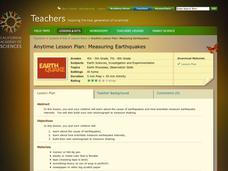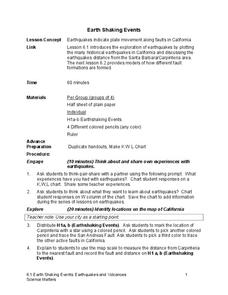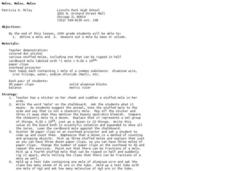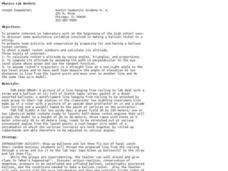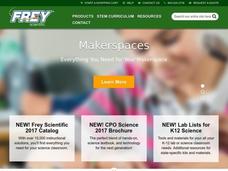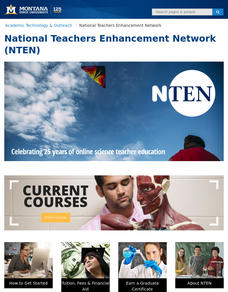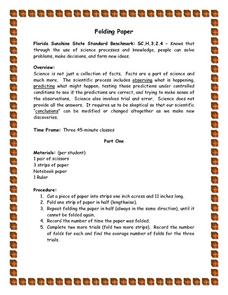California Academy of Science
Measuring Earthquakes
After a brief discussion on earthquakes, make a makeshift seismograph to record the shaking of the table that it sits upon. While the background information will be useful to you as a teacher, the seismograph does not seem like it would...
Curated OER
Filling the Glass (Water, Air, and Fractions)
Students predict which of two glasses is 1/2 full using visual estimation, height measurement, and liquid measurement methods. Mathematical equations to accurately solve the problem are determined and verified.
Curated OER
How Do Astronomers Measure Distances to Stars?
In this astronomy worksheet, students participate in an activity using the parallax effect to measure star distances. They record their information in a data table then complete 5 fill in the blank conclusion questions.
Alabama Learning Exchange
Straight Line Motion
Students examine gravity, mass, and friction. In this speed and motion instructional activity, students investigate how straight line motion is impacted by gravity, mass, and fiction as they participate in a hands-on activity.
Curated OER
Capillary Action
In this capillary action worksheet, students follow directions to see the ability of liquids being drawn up into small spaces using beakers, paper, rulers, food coloring and more. Students follow 8 sets of directions and write a...
Curated OER
Density-Qualitative and Quantitative
Students investigate density using film canisters filled with different density materials and larger objects of varying density. In this density lesson plan, students discuss the concept of density and rank film containers from dense to...
Science Matters
Earth Shaking Events
The world's largest measured earthquake happened in 1960 in Chile, reaching a terrifying 9.5 magnitude on the Richter Scale. The second lesson in the 20-part series introduces earthquakes and fault lines. Scholars map where previous...
Curated OER
Observation Milk Fat Lesson
Turn your class loose to experiment with the different fat content in skim milk, whole milk, half and half, and heavy cream. This is a visually vibrant experiment, as learners drip food coloring on the surface of the products and measure...
Curated OER
Principles of Flight: Flying Paper Airplanes
Students investigate ways to enhance an object's flying ability. In this model construction instructional activity, students construct two paper airplanes, one of which is twice as big as the first. Students compare and...
Curated OER
Water on Mars!
In this water on Mars worksheet, students use a diagram to answer four questions about the structures in the image. They find the dimensions of the image, the width of the streams half-way down their flow channels, the smallest feature...
Curated OER
Moles, Moles, Moles
Students investigate moles and measure out a mole by mass and volume. In this mole lesson plan, students observe demonstrations of quantities of substances that measure 1 mole. Students use a solid aluminum block and ruler to measure the...
Curated OER
Egg Hunt
Students make detailed qualitative and quantitative observations. They are introduced to the process of developing repeatable procedures. Students practice collecting data. They review measurement skills. Students become familiar...
Curated OER
What The Peanuts Say: Catabolism and Calories
Students investigate the energy released by a peanut and a piece of a walnut. In this catabolism and calories lesson plan, students burn a peanut and a piece of a walnut and measure the temperature of the water before burning and after...
Curated OER
Ice is N"ICE"!!
Students observe and describe, both orally and in writing. the different forms of water on the surface of the Earth and measure the approximate size of an iceberg. They also estimate and measure the amount of ice that floats above the...
Curated OER
Physics Lab Rockets
Young scholars construct and test balloon rockets and a model rocket. In this rocket science lesson, students use an inquiry-based method to master balloon rockets and have a shoot-off with the goal of attaining the highest altitude....
Curated OER
Can You Find the Difference?
Young scholars create their own balance to determine a difference in the weight (and composition) of cents made in different years.
Curated OER
Natural Selection
Students observe, measure and record variations that may be due to genetic inheritance. They look at the length of seeds for germinating pinto and lima beans and measure the distance between eyes in humans. They graph and discuss the...
Curated OER
How Do We Breathe?
Students study the structure of the lungs. For this lung structure lesson, students use lung models to study the structure of lungs and experiment to measure the amount of air in the lungs.
Curated OER
Do Human Practices Affect Water Quality?
Young scholars determine if human practices have any noticeable effects on the quality of stream life as measured by the presence of certain macroinvertebrates. They collect, preserve and identify macroinvertibrate samples and quantify...
Curated OER
Folding Paper
Young scholars use the scientific process and their knowledge to obeserve, predict, and test their predictions under controlled conditions to verify their predictions and then make sense of these predictions. They also graph, write...
LABScI
Potential and Kinetic Energy: The Roller Coaster Lab
Ron Toomer, a famous roller coaster designer, suffered from motion sickness. Pupils design their own roller coasters, learning about potential and kinetic energy in the process. Labs focus on the importance of drop height, energy...
PBS
Four Corners
It's imperative to be as precise as possible. Future engineers learn about precision by building a cardboard machine. The base, corners, handles, and paddles must all be assembled with precision or the machine won't work.
Curated OER
The Unseen Ocean Floor
Students build ocean floor structures, then map and model an unfamiliar ocean floor. They are introduced to bathymetry and sea floor features, and discover one of the most widely usd methods for studying the ocean.
Curated OER
Plotting Earthquakes
Students plot earthquakes on a map. In this instructional activity on earthquakes, students will explore recent earthquake activity in California and Nevada. Students will plot fault lines and earthquake occurrences on a map.
